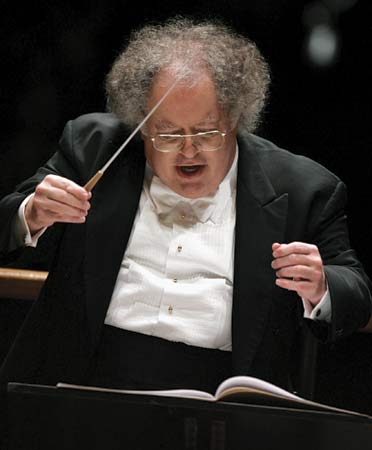Carter premiere shows new directions cut short via Levine, MET Chamber Ensemble

James Levine led the MET Chamber Ensemble in the world premiere of Elliott Carter’s “The American Sublime” Sunday at Zankel Hall. File photo: Steven Senne
After 103 years, and with an extraordinarily strong and productive patch that began when he reached his late 90s, there are still pieces by Elliott Carter yet to be heard, a proposition that’s both exciting and sad.
Sunday afternoon at Zankel Hall, the MET Chamber Ensemble, conductor James Levine, and bass-baritone Evan Hughes gave the latest posthumous Carter world premiere, The American Sublime, a setting of five Wallace Stevens poems that Carter composed, along with a half-dozen or so other works, in 2011.
This is a dramatic, vibrant work, direct and forceful when so much of late Carter is playful and elusive. The composer was a sensitive and intelligent reader of literature, and the music articulates strong yet mysterious reactions to the poems. Hughes’s sonorous voice was the perfect color for the instrumentation, which emphasizes low winds—two alto flutes, a bass flute, bass clarinet, contrabass clarinet and contrabassoon. His superb intonation blended with the extended dissonances of Carter’s chords, and he was vivacious in the two settings that pair him with percussion.
What is tantalizing, even maddening, about the piece is the hints it leaves of what might have been a new direction in Carter’s work, a stylistic transformation in what was the early years of his second century. There is the structured repetition of chords and phrases, which is remarkable vis-a-vis his long compositional maturity, and a rich orchestration that is the opposite of the exceedingly lean, strong textures he valued over his last few decades.
Interpreting Stevens’ poems may certainly have demanded these details, but taken in conjunction with the similar style of his A Sunbeam’s Architecture, a 2010 vocal setting of e.e. cummings, there is the indication of a trend, cut prematurely short, as absurd as that may seem.
Carter dedicated the work to Levine, one of his long-time champions, and the remaining program was made up of music that is clearly personally important to the conductor.
The concert opened with Stravinsky’s Octet, played brightly but lacking just the last amount of bite in the brass. This is one of Stravinsky’s finest content-free pieces, music that fulfilled his view that the art form could not represent anything other than its own making. Music with this much brilliant counterpoint, rhythm, inventive changes in tempo, and model orchestration tend to reinforce his argument.
Between the Octet and the Carter premiere, there was Charles Ives, represented by his Scherzo: Over the Pavements. This is distilled, vintage Ives, music that sounds like a bad marching band full of good spirit, or a good marching band full of spirits. It’s a scherzo in the original sense, a joke made with seriousness. Although they were concentrating too fiercely to be fully relaxed, the musicians and Levine played with exacting rhythms that revealed every detail, and all seemed delighted by the results.
Stravinsky was an amiable companion to John Cage’s Atlas Eclipticalis, which opened the second half. Although their methods and materials were vastly different, their values were close. While Stravinsky intentionally made music with an objective attitude, Cage wanted sounds to be free of musical significance.
Cage’s music was drawn from star charts, the stars coming to represent pitches and dynamics. There is no rhythm or tempo—the musicians have a specific period of time in which to play their individual parts—nor set instrumentation and duration. Levine let the piece run for a shade over six minutes, and the MET musicians showed an impressive level of comfort with the idiom, which asks them to go against decades of training and experience. The quiet, shifting tintinnabulation of sound was enticing, and although not in the same realm as the dimension-altering performance by the Orchestra of the S.E.M. Ensemble in October of 2012, the piece was working well, and it’s a shame the performance was so short.
Perhaps Atlas was brief because the final piece, Charles Wuorinen’s It Happens Like This, was so substantial. And fabulous.
This is a 2010 work, commissioned by Levine, although his spinal injury not only kept him from leading the premiere at Tanglewood, but from preparing the music since. So he passed the reins off to Wuorinen, who conducted adequately Sunday but, based on the performance, also prepared the musicians well.
This is another vocal piece, for the ensemble of soprano Sharon Harms, mezzo Laura Mercado-Wright, tenor Steven Brennfleck, and bass-baritone Douglas Williams. Wuorinen sets seven of James Tate’s deadpan absurd prose poems. The music is mostly atonal, though there is the occasional tonal chord or cadence, but the main point is that it serves as a backdrop for singing and reciting that is so characterful and charismatic—especially with these singers—that the piece is almost a modernist chamber opera.
This is Wuorinen as entertainer, and when he wants to entertain he’s formidable. The music gives full support to the dreamlike text, full of mordant humor and the barely suppressed feeling of unnameable menace. Like a dream, the piece keeps one off balance, and has the excitement of feeling a little subversive and even dangerous, like the love child of Carl Stalling and Del Close. Charles Wuorinen, ladies and gentlemen, America’s last beatnik composer.
The MET Orchestra plays Brahms and Berlioz, 3 p.m. May 17. carnegiehall.org


Posted Mar 09, 2015 at 12:01 pm by Rodney Coniff
I attended this concert and have a few comments. First, the reviewer should have pointed out that another Charles Ives pieces which had been scheduled, “From the Steeples and the Mountains,” was not played. It would have been nice if someone (Mr. Levine) told us why it had been scratched. This was very disappointing as it is an incredible piece and I had never heard it in concert before.
I also disagree completely with the reviewers evaluation of the Carter and Wourinen pieces. The Carter piece was stultifying. If this piece had been submitted by an unknown composer, I guarantee it would never have been played. It was full of all the tired “gestures” that makes modern music unlistenable to the vast majority of people. There was nothing to distinguish it from the mountains of almost identical blather that is churned out by the carload.
And Mr. Wourinen’s piece was equally lame. I defy the composer to tell us “why” he chose certain lines to be spoken and others to be sung. And the poems he set were examples of what people who have no sense of humor think is funny. It isn’t good poetry, and it isn’t funny. And the instrumental music was basically 2nd-rate background noise which was truly meaningless. It is amazing to me that this sort of thing is ever played.
On the other hand, the Stravinsky, the Cage and the single Ives piece all made the concert worth hearing. They are three gems, filled with the humor and interest and invention totally lacking in the Carter and abysmally missing in the Wourinen.
It would have been so nice if Mr. Levine had replaced the Carter and Wourinen with other works by Cage and Ives. These are the truly great American composers. Unfortunately, Levine has a “thing” for Carter and for some reason thinks Wourinen is worth playing. He’s a brilliant musician and conductor, but he’s totally off base with these two.
Posted Mar 09, 2015 at 10:05 pm by Richard Thompson
Sadly, I agree completely with Mr. Coniff. I wish it were otherwise. I attended the concert with the expectation of an Ives work, always an interesting prospect. All Mr. Coniff said of the Carter piece is true. Mr . Levine ( my hero) should know better. Carter is not always capable of producing the masterpieces that Mr. Levine champions, but many of us do not hear.
Posted Mar 29, 2015 at 1:06 pm by ზვიად
I heavily disagree with the comments above. I don think Carter’s lates vocal works are among his best.